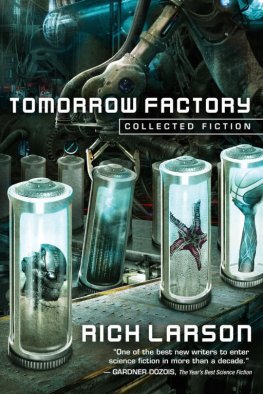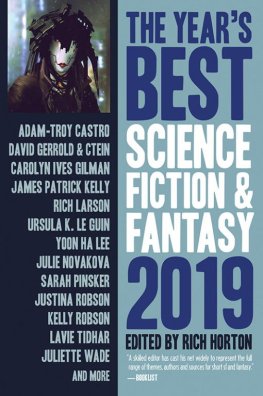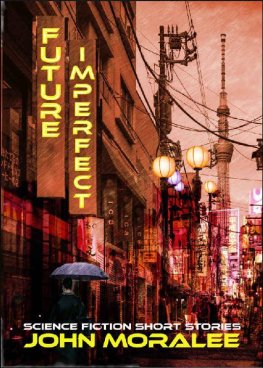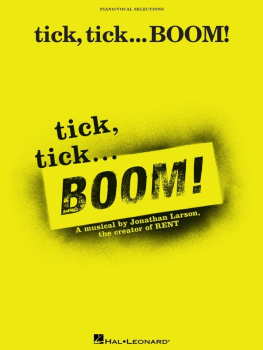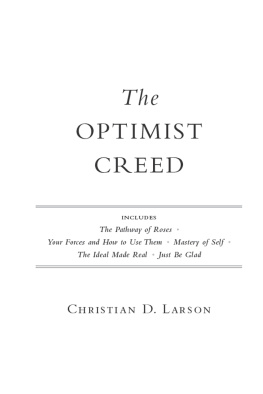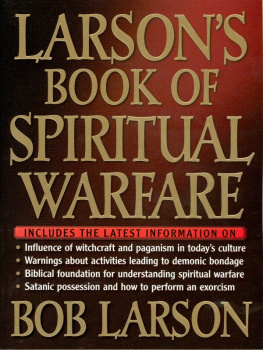Rich Larson
TOMORROW FACTORY
COLLECTED FICTION
For Gardner Dozois (19472018), a giant who lifted others into view
and for Helen Wiebe, with all my love

INTRODUCTION
James Patrick Kelly
Im going to introduce you to a new writer in a moment, one who is unlike any new writer Ive encountered in my forty-some years in science fiction.
But first, what is a new writer?
You may not realize that new writers can remain new for years and years. The clock starts when someone who has been messing around with sentences and scenes in their spare time decides that what theyre looking at on their screen is pretty good, and that other people might want to read their work. They have decided that they are writers, although often as not they are reticent to proclaim this. But they work on their craft until they believe theyre ready for the next step: submitting their work for publication.
New writers in this phase of their development are sometimes called aspiring writers. Many of them never get the validation they need to persevere through the agonizing slog to the promised land of the first sale, but enough do. After an acceptance or two, the world (or at least a few editors and some readers), will begin to recognize that a new writer has arrived on the scene. The more the new writer publishes, the more folks notice. But it is often the case that, while early sales may portend mastery, they do not necessarily reflect it. We naturally cut the fledgling writer some slack. We say things like, Hes pretty goodfor a new writer. In my own case, for example, I published maybe nine or ten stories in professional markets before I hit my stride. I am not ashamed to admit that I served my apprenticeship in print during my new writer years.
In 1993, a Swedish psychologist named K. Anders Ericsson published a paper with the long-winded title The Role of Deliberate Practice in the Acquisition of Expert Performance. This helped launch what has come to be called the science of expertise. Ericsson questioned the notion of heritable talent, as in, Shes a born violinist or He was born with a painters eye. Instead, he and others have proposed a different theory of mastery, which is supported by studies across disciplines as various as chess and basketball, business and the arts. The way you get really good at something is a) to practice b) with feedback c) over time. Its a three-legged stool: just practicing isnt enough. Somehow you have to learn what youre doing right and what youre doing wrong. And you have to keep at it for a long time. Popularizers of deliberative practice have come up with a number: 10,000 hours. According to this timetable, if you practiced deliberativelywith proper feedbackfor three hours a day, it would take you some nine years to achieve mastery. My own extensive research into this (gossiping with writer pals) largely confirms the basics of deliberative practice theory.
Which brings us to the curious case of Rich Larson. His website tells us that Rich was born in Galmi, Niger, to an American father and a Canadian mother. He has since lived in Grande Prairie, Alberta, studied in both Edmonton and in Providence, Rhode Island, and worked in a small Spanish town outside Seville. He currently writes from Ottawa, Canada.
He is twenty-five years old.
The first time I remember meeting Rich was when he was an undergraduate at the University of Alberta. This would have been at the International Conference on the Fantastic in Orlando, Florida in March of 2014, when he won the Dell Magazines Award for Undergraduate Excellence in Science Fiction and Fantasy Writing. Actually, I may have met him in 2013, when he was second runner up for the award. Ill admit Im a little hazy about this; I meet a lot of new and aspiring writers. My memory of our meeting in Orlando was that Rich was a quiet and unassuming young man, but a confident one. I had the sense that he was checking out the conferenceand our little corner of literatureso he could get the lay of the land. We met again unexpectedly three months later, when I was enlisted at the last moment to fill in for an ailing colleague at the Clarion West Writers Workshop. I was recruited on a Wednesday and arrived in Seattle on a Saturday. Rich was a student at the workshop and Im still embarrassed that I didnt recognize him on that jetlagged first day. The face was familiar but. Like I said, I meet a lot of new writers. It wasnt until a day or two into my week of teaching that I realized who he was. But I do have a vivid memory of the one-on-one conference I had with him toward the end of my time at Clarion. We brainstormed a problem story and talked about his plans after the workshop. Once again, I was impressed by his confidence and sense of purpose. And his writing was wonderful, mature beyond his years. So I invited him to stay in touch and consider me a resource as he pursued his career. And so here we are, three years later.
But I could never have imagined back then what Rich would go on to accomplish in those three years, and I have a pretty good imagination. If you look him up in the invaluable Internet Science Fiction Database, you will discover that he has published fifty-four stories since 2014. For some writers, thats an entire career! And he has impressed pretty much all editors he has ever sent stories to. In this collection alone, youll find stories from Asimovs, Interzone, Clarkesworld, Daily Science Fiction, AE: The Canadian Science Fiction Review, Lightspeed, Apex, Abyss and Apex, Analog, Strange Horizons, Escape Pod, and the anthologies Clockwork Phoenix 5 and Futuredaze.
Being this prolific is an achievement in and of itself, but its not without precedent in science fiction. Back in the pulp days of the 1930s and 40s, there were writers who could sell their stories almost as fast as they could type them. But were those stories any good? More important to you, are these stories any good? I happen to think theyre very good indeed, but you dont have to take only my word for it. Consider that stories from Tomorrow Factory have appeared in eight different Best of the Year anthologies and that one of them, All That Robot Shit, was voted by the readers of Asimovs as the best short story of 2016.
So when I say that Rich Larson is unlike any new writer Ive encountered in my career, I am talking about the quantity and quality of his writing. What Rich has accomplished since 2014 is comparable to the amazing early careers of celebrated writers like Lucius Shepard, or Connie Willis, or Samuel R. Delaney.
Except for one thing. Rich is twenty-five years old, and all of those greats began their careers later, sometimes much later, in life. When did Rich start his deliberative practice? How did he cram his 10,000 hours in? Dr. Ericsson, I think we have an outlier here!
You hold in your hands the first collection of a new writer. But this is not just any first collection and, new as this writer is, he has already established himself with readers and critics and me as one of our best. The proof is on the next page. So settle in and get comfortable, because even though our journey with Rich Larson has just begun, it has a long, long way to go.
James Patrick KellyNottingham, NHOctober 2017

We made you, you know.
Carver Seven listens intently. Lately the Man, who also self-designates as Mikhail and Only Human Being On This Fucking Island, has not spoken often. Instead it stares off across the sea in silence, or makes its snuffling animal sounds while excess lubricant from pivoting photoreceptors leaks down the front of its head and spatters the sand. The Man once referred to this process as crying like a little bitch.

